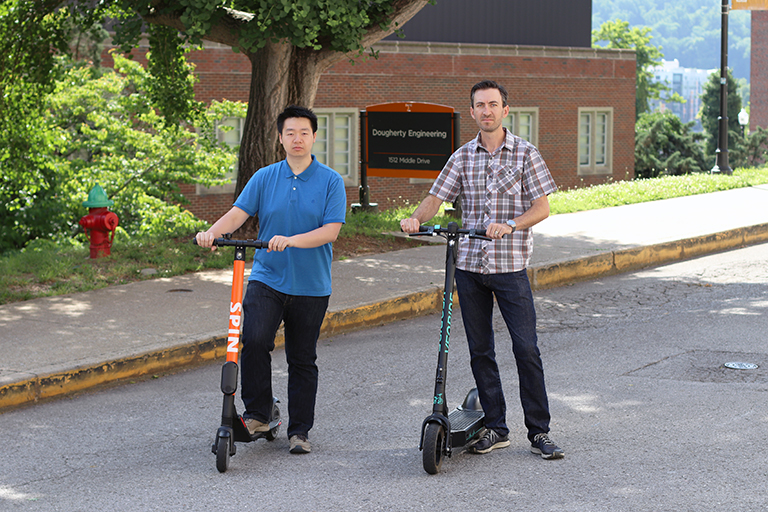
Americans are growing more and more accustomed to seeing e-bikes and bicycle-sharing programs in urban areas, but e-scooters are still a relatively new phenomenon that has yet to be fully understood.
UT Professor Chris Cherry and doctoral student Yi Wen are investigating the pros and cons of this technology as it relates to safety, public policy, and best practices.
“These are challenges from a safety perspective to try to understand the problem,” said Cherry, who sits on the Global Safety Advisory Board with the e-scooter company Bird and has been cited for his e-bike and scooter expertise in numerous global publications.
—Chris Cherry
When electric bikes and mopeds arrived in China nearly 20 years ago, it disrupted the transportation landscape by creating more micromobility options, but those issues can now serve as an important lesson for areas currently adopting scooters.
Now that e-scooters have been deployed in a six-month pilot program in Knoxville, the opportunity to better educate both officials and the public in general has taken on a more personal aspect for the UT researchers, who hope to use safety as a unifying topic to foster discussions between scooter companies, government officials, universities, and visitor centers.
Right now, even basic data about e-scooters can be misunderstood, like how many are involved in car crashes, for example.
Currently, when a scooter is hit by a car in Tennessee it’s coded as a pedestrian or some other vehicle simply because there is no option to select “scooter crash” on police records or in emergency room intake forms. Compounding the issue, when someone takes the initiative to list the incident as a scooter crash in the description, there is uncertainty about what kind of scooter they mean, as e-bikes, kick scooters, mopeds, and even motorized wheelchairs fall into that category.
Cherry and Wen say their expertise can offer additional valuable insight through data analysis and are open to working with the city to prioritize or help identify dangerous spots or missing infrastructure to help guide sound policies related to micromobility or other forms of transportation.
—Yi Wen
Even with some access to data from companies operating in Knoxville, broad statistics relating to scooter use—such as whether rides are for recreation or commuting, for example—won’t be easy to conclude.
Companies currently operate and cities regulate without a clear understanding of how policies affect desired outcomes. For example, scooters can be ridden on Neyland Drive next to 45 mph traffic, but not on the Neyland Drive Greenway, which offers a safer, more comfortable experience.
Cherry champions the Vision Zero philosophy on road safety, which aims to achieve zero fatalities or serious injuries involving road traffic.
“I believe that, in cities, we can have no severe or fatal injury crashes,” he said. “How do we do that? With really good policy.”
Their research, which began in the infancy of the e-scooter phenomenon, is funded by three grants, SAE: Developing a Typology of Micromobility Devices; SEIC: Understanding the Impacts of Bike Sharing and Electric Scooter Sharing on UTK Campus; and CSCRS: Understanding micromobility safety behavior and standardizing safety metrics for transportation system integration.
Contact
Élan Young: elan@tennessee.edu